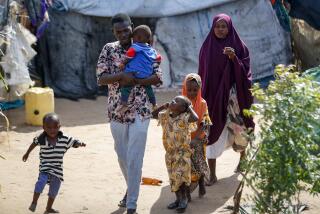Somalia Fears Rise as Peace Force Dwindles : Africa: U.N. officials worry about a new outbreak of hostilities.
- Share via
UNITED NATIONS — Although images of stick-limbed, swollen-bellied babies no longer numb the minds of workers in Somalia, U.N. officials are troubled by hints of potential disaster as the peacekeeping force there dwindles in size and power.
“It’s a shaky situation, a touch-and-go situation,” said Jan Eliasson, the Swedish diplomat who is departing as U.N. undersecretary general for humanitarian affairs. “What we fear is an outbreak of hostilities.”
In a report to the Security Council two weeks ago, U.N. Secretary General Boutros Boutros-Ghali warned, “Though the fight to end famine in Somalia has been successful, several indicators suggest that in the past few months malnutrition levels are again on the rise in parts of Somalia.”
Both U.N. and private relief officials, however, stress that large-scale feeding of the population has not resumed. Moreover, most private agencies, while acknowledging the persistence of troubling signs, insist that, compared with the dispiriting scenes of a little more than a year ago, the current relief situation in Somalia is a marvel.
A Nov. 29-Dec. 1 conference of Somali leaders and foreign relief workers convened by Eliasson in the Ethiopian capital of Addis Ababa concluded that the mass starvation and malnutrition that first brought U.S. Marines to Somalia a year earlier had ended. It was now time to close out mass feeding programs and start reconstruction and development projects such as laying roads, building schools, clearing mines, supplying electricity and purifying water.
At present, the United Nations has 25,000 peacekeeping troops in Somalia. In addition, the Clinton Administration deploys 5,500 U.S. troops in the Horn of Africa nation and almost 4,000 others on ships offshore. After 18 U.S. soldiers died as the result of a raid last October, however, President Clinton announced the withdrawal of all U.S. troops by March 31.
Once the U.S. deadline passes, Boutros-Ghali expects to be able to field no more than 16,000 peacekeeping troops, almost all from the developing world, a large number without adequate military equipment.
In his report to the Security Council, Boutros-Ghali wrote that “the security situation in many parts of Somalia has given rise to concern.”
Yet, the secretary general said, “the countryside continues to enjoy a level of security far superior to that of 18 months ago.”
Within the capital of Mogadishu, the situation, according to the secretary general, was less sanguine. He reported that “armed banditry on the streets of Mogadishu has grown considerably.”
In a brief discussion of food shortages, Boutros-Ghali said that “in the lower Juba Valley . . . acute malnutrition among children under five has doubled to 20%.”
The problem has been complicated by a shortfall in the November-December harvest.
More to Read
Sign up for Essential California
The most important California stories and recommendations in your inbox every morning.
You may occasionally receive promotional content from the Los Angeles Times.












